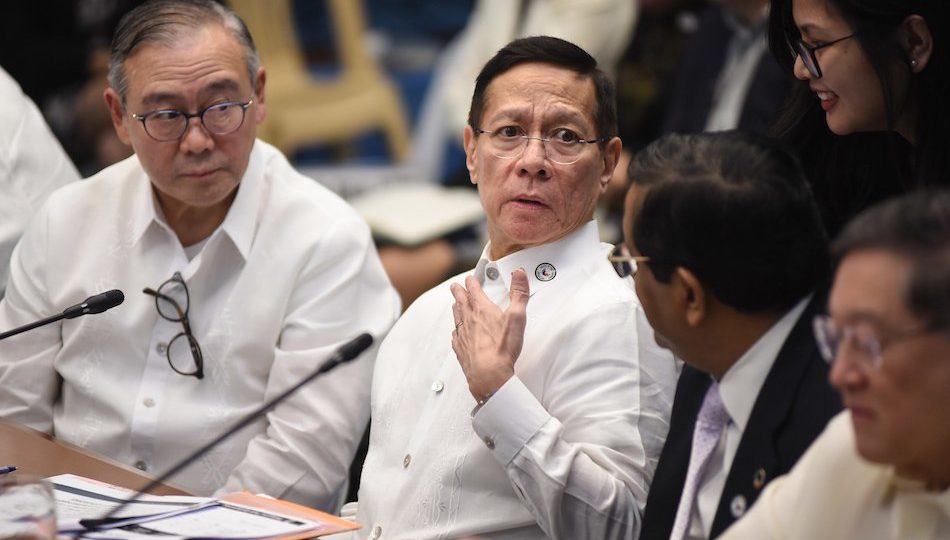Health Secretary Francisco Duque today said in a radio interview that he’s baffled why more than a dozen lawmakers have called for his resignation over his supposed less-than-ideal handling of the COVID-19 pandemic.
At least 14 senators yesterday filed a resolution that cited Duque’s “inefficiency,” “lack of foresight,” and what they characterized as a general failure in leadership, which led to the deaths of hundreds of Filipinos including the country’s healthcare workers.
Read: ‘Failure of Leadership’: Senators urge Duque to resign amid rising COVID-19 cases
“I cannot understand their [senators’] basis for judging my performance [as health chief]…I don’t understand what else should I do,” Duque told radio station DZMM in Filipino. He noted, however, that he is not taking the matter personally, and will take the criticisms “objectively” to improve in his job.
The controversial health secretary said that the pandemic is a “very tough” problem, not just for the Philippines, but the rest of the world. He said that several officials and health workers for the Department of Health (DOH) have already tested positive for the coronavirus.
“And because the enemy [COVID-19] is great, it’s better for us to unite so we can fix the problem and implement solutions for it,” he said in Filipino.
In their resolution, the lawmakers also cited the DOH’s lack of transparency in reporting about the cases, and an apparent backlog in testing persons suspected of the disease.
Duque admitted in the interview that the government-managed Research Institute of Tropical Medicine has yet to complete a lot of coronavirus tests but some have already been sent to other labs for processing. Duque said that the DOH aims to complete up to 10,000 tests each day by April 30 and that these will be processed by labs non-stop for 24 hours.
“The backlogs are farmed out to subnational laboratories like Lung Center [in Quezon City], and San Lazaro Hospital [in Manila],” he said.
Read: Marikina City to open COVID-19 testing lab without Health Department’s approval
Meanwhile, Duque promised that Marikina City’s testing lab will be accredited on Wednesday after several weeks of delay.
The city proposed a new location for its COVID-19 testing lab in late March, days after the DOH rejected its first proposal. Mayor Marcy Teodoro said that he wanted to set up the lab to help his constituents get tested for the disease quicker. Following the heath department’s sluggish inspection and approval, Teodoro said that he will push through with the opening of the facility without the DOH’s approval, and that he was ready to be sued by the DOH, whose team was supposed to inspect the PHP3.8 million-worth (US$75,000) facility earlier this week but did not show up.
Duque, meanwhile said that the DOH is still strictly checking the quality of the lab’s equipment and if its personnel have been adequately trained because they have to meet safety standards.
“If the virus isn’t handled properly, there might be an epidemic in the laboratory, and from the laboratory, there might be a community transmission. So that is why we’re strictly implementing rules,” he said.
Earlier last month, Duque cited a lack of testing kits for the possible underreporting of coronavirus cases in the country, which for several weeks since it first broke out in Jan. 30 stood at a mere three cases, with a string of new cases reported daily a month after. Following a rise in COVID-19 deaths, Duque admitted in early March that he should have declared a state of public health emergency sooner. He said that he considered the World Health Organization’s (WHO) declaration of emergency a blanket declaration which should also apply to the Philippines, a WHO member country.
The WHO declared COVID-19 a matter of international public health emergency on Jan. 30, on the same day that the Philippines recorded its first confirmed coronavirus case.
Despite this, Duque had put off imposing travel restrictions to China saying it was “tricky.” The ban was later imposed in mid March after the country saw its first COVID-19 death, which was also the first recorded death outside of China.
To date, nearly 400 people have died of COVID-19 in the country, and the Philippines has been ranked the ninth riskiest country in the world to be in during the coronavirus pandemic, the highest ranking of a Southeast Asian nation.





Reader Interactions